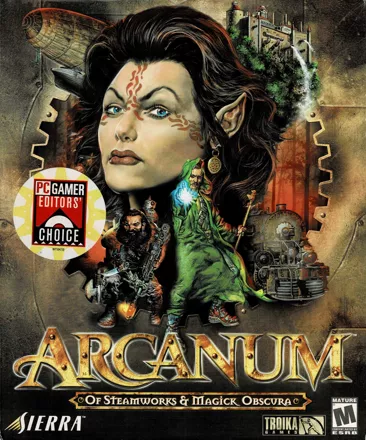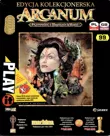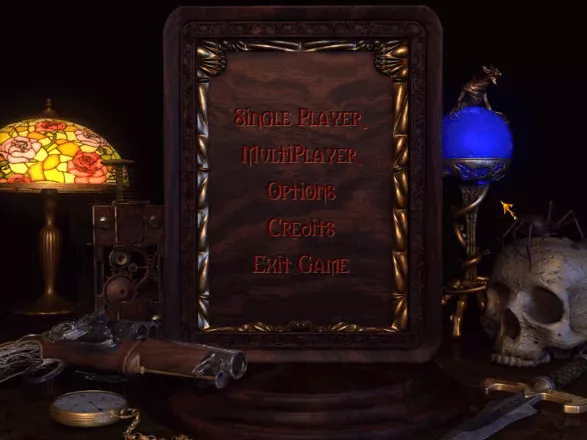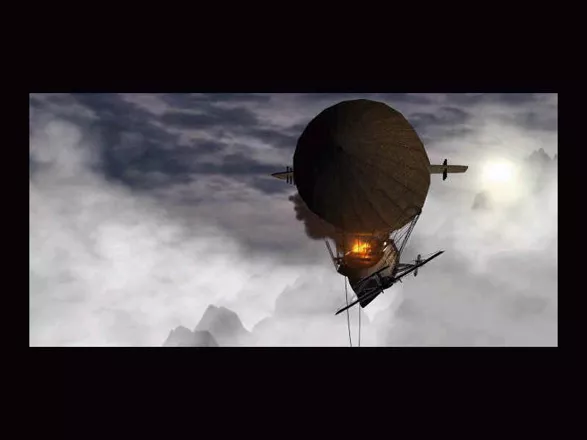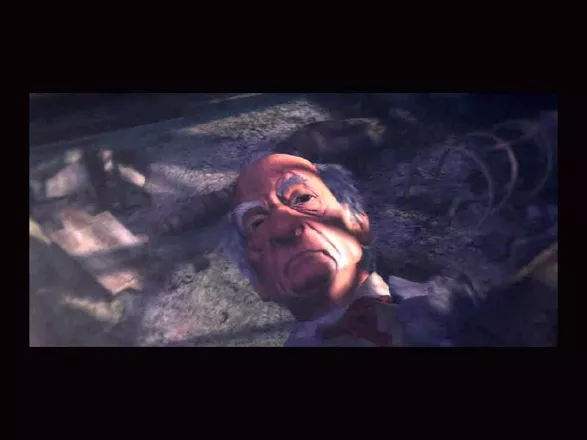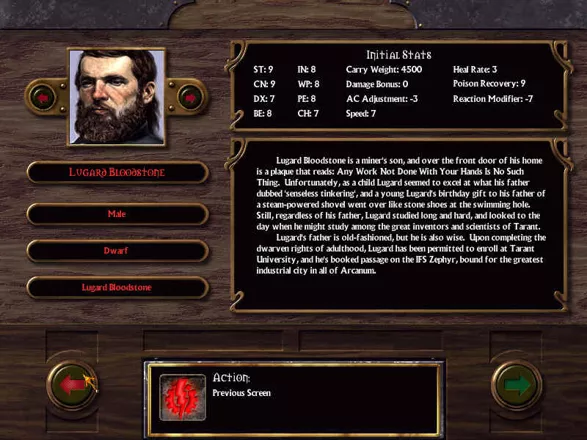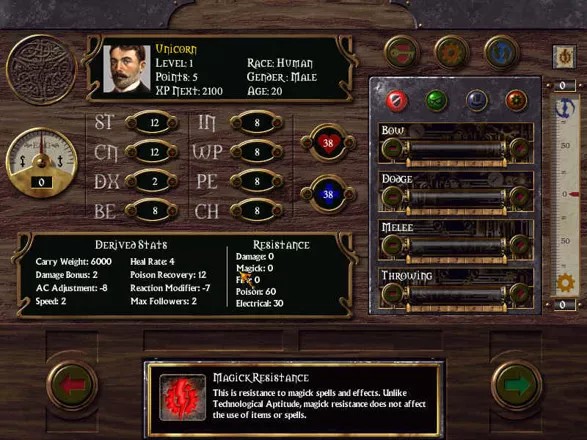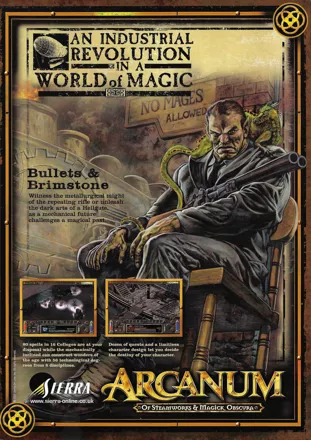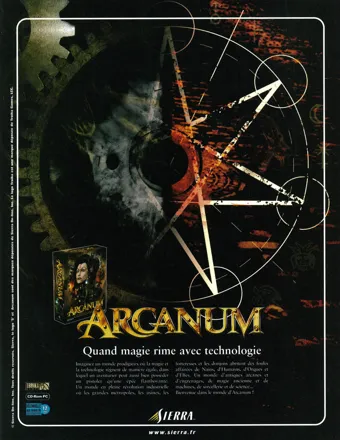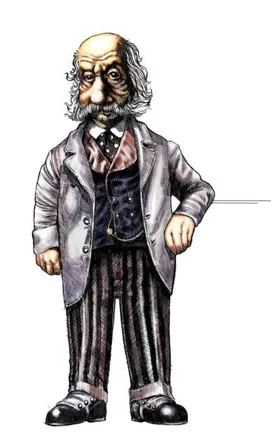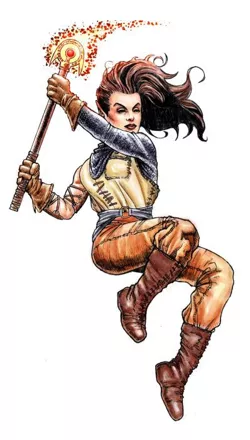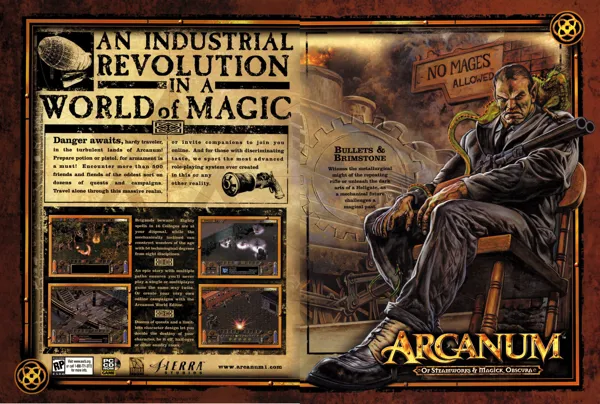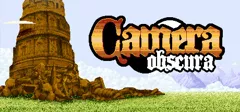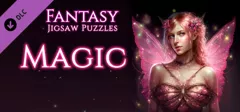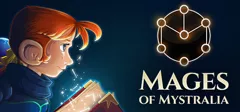Arcanum: Of Steamworks & Magick Obscura
Description official descriptions
The luxury zeppelin IFS Zephyr begins her maiden voyage from Caladon in the Kingdom of Arland to Tarant, one of the largest cities in the technologically advanced Unified Kingdom. Suddenly, while the zeppelin is cruising over mountains, two monoplanes attack it and eventually shoot it down. The two half-ogre attackers die in flames along with all their victims except two who miraculously survived. However, one of them, an old gnome, is mortally wounded. Just before he dies, he gives a silver ring to the other survivor and tells him to "find the boy". The witness of the crash, a man named Virgil, declares that the now only survivor is "The Living One", a reincarnation of a deity, and offers to follow him wherever he goes. The hero begins a long and perilous search for the mysterious boy, the origins of the silver ring, and the unknown enemy who was behind the attack on the zeppelin.
Arcanum is a role-playing game similar in concept and many gameplay principles to Fallout. It is set in a unique world, which can be described as mixture between Tolkienesque fantasy, steampunk technology and elements of British and North American culture of the 19th century: dwarves may carry molotov cocktails, and a half-orc protagonist can travel by train between Victorian-like cities. Magic and technology are opposed to each other; most humans and dwarves embrace technology, while some elf clans stick to the old ways and consider scientific progress evil.
In the beginning of the game the player creates the main character, choosing from a variety of races, attributes, magical or technological disciplines, social skills, backgrounds, etc. When the character levels up, the player can increase his main parameters as well as any available skills. Like in Fallout games, the player directly controls only one character; however, companions who join the party may be given orders, and their inventory can be managed by the player.
The game is open-ended: the player is free to explore the vast world from the onset, undertaking a large amount of side quests or following the main story. Social interaction plays a significant role: depending on the player character's charisma and intelligence attributes, as well as persuasion skill, many problems can be solved in a non-violent way. The amount of companions willing to follow the protagonist also depends on the latter's charisma rating; companions may also leave the party if they disagree with the hero's behavior.
The player can select one of the three combat modes for the game: real-time, turn-based, and fast-paced turn-based. Turn-based mode is similar to the combat in Fallout games: characters require action points to move, attack, or cast spells.
The game includes an editor called WorldEdit, which allows players to create their own maps, campaigns, and non-playable characters. Objects from the base game can be carried across to the player-created scenario. The scenery editor allows players to create their own objects. It is also possible to set and change game variables, i.e. the amount of skill points required to perform a specific task.
Spellings
- 奥秘:技术与魔法 - Chinese spelling (simplified)
Groups +
- BestSeller Series (Cendant / Havas / Vivendi Universal) releases
- Fantasy creatures: Dwarves
- Fantasy creatures: Elves
- Fantasy creatures: Gnomes
- Fantasy creatures: Halflings / Hobbits
- Fantasy creatures: Orcs
- Gameplay feature: Alchemy
- Gameplay feature: Brothels
- Gameplay feature: Character development - Skill distribution
- Gameplay feature: Gambling
- Gameplay feature: Karma meter
- Gameplay feature: Multiple endings
- Middleware: Bink Video
- Physical Bonus Content: World Map
- Protagonist: Female (option)
- Sound engine: AIL/Miles Sound System
Screenshots
Promos
Videos
Add Trailer or Gameplay Video +1 point
See any errors or missing info for this game?
You can submit a correction, contribute trivia, add to a game group, add a related site or alternate title.
Credits (Windows version)
157 People (118 developers, 39 thanks) · View all
| Project Leader | |
| Lead Programming | |
| Programming | |
| Design | |
| Animation | |
| [ full credits ] | |
Reviews
Critics
Average score: 79% (based on 61 ratings)
Players
Average score: 4.0 out of 5 (based on 168 ratings with 13 reviews)
An engrossing and impressive rpg that ultimately lives up to it's potential.
The Good
There's a lot to love about Arcanum, it's the first rpg to come out from the runaway splinter group of Fallout's developing team, and suffice to say that the pedigree shows.
The game provides a truly engrossing experience, in a completely unconventional setting, with lots of rpg-ing goodness and a wonderful character editing system.
Truly the game's strongest point is it's world, it's a mixture of traditional fantasy elements with a strong "steampunk" edge that makes for an incredibly unique gameworld (sort of like "Thief meets The Difference Engine"). A gameworld that is populated to the max with npcs, quests, and places to explore. This of course takes the focus off the main plot, but as long as you understand that, that half the fun in Arcanum comes from exploring and fooling around at your leisure, then you'll be okay. Arcanum appeals to those types of players that want to experience a game from end to end, not just 1 (one) adventure in 1 (one) setting. If you want everything tied up nicely with the main plot then you are barking at the wrong three. The game has millions of sidequests that both enrich and liven up the experience (if you are willing to put the storyline in the back-burner for a while) in fact, few games take you off the main plot to explore an X-files like conspiracy or have you solve murder cases, negotiate political treaties, or lots of impressive quests like the exceptional one with the fortune teller early on....Granted, the game has a bit of "filler" material, but it's nothing compared to the amount of innovative and truly interesting quests it has in store. And the story itself even though is starts out rather bland, gets way better as the game progresses, with a lot of good twists and situations.
The npcs that can be added to your party come in a nice variety, and add a lot of color to the game, they add info and comments on locations and have their background, motivations and will add their own participation to the storyline. Only a select few have this however (tip: choose the talking ones! ;)) and they don't add as much color as in other games like Baldur's Gate, but they bring a lot more to the game than more inventory space and fighting muscle. Whoever says they are merely packhorses hasn't taken Magnus around, or left Virgil early on in the game, didn't take Z'an A'zul Rhin (or whatever!!) to Arronax, left Raven to rot in Quintarra, or didn't even bother to check Torian, etc...
Another highlight of the game is it's powerful character editing system... Which again, will piss off players that have little grasp of what they want. I'm not calling myself an expert in this types of games, but I have seen newbie rpg friends stare blankly at the screen trying to figure where to put their skill points. One must certainly know what he wants when he creates his character, and must be prepared to steer him in the direction that matches his playing style. As in other skill-based rpgs like the Fallout games, the character evolves continuously, and is not limited by a particular class. However the character system in Arcanum goes a step further and in some aspects even surpasses Fallout's S.P.E.C.I.A.L. system. For starters it's based on points, which as even the remaining Black Isle developers admitted, works a hell of a lot better than Fallout's percentage system. You could sometimes add 15% to a skill and nothing tangible would happen, you always had to raise the percentages above certain "milestones" to get stuff to happen (say, 50, 70, 100, 150, etc.). On Arcanum you get a small number of points to add to any skill, but said points ALWAYS make a difference, so needless to say there's a great feeling of reward for every point earned, not to mention that you have considerable bonuses for excelling on each skill like being able to buy worn items, get any npc in your party regardless of alignment, etc.
Furthermore, the game allows you to put points into your basic skills, which is to me, another great choice. The lack of that option in the Fallout games placed you in a shell you had no chance of getting off in the game, once you assigned your points, it remained forever etched in stone for the rest of the game... effectively thrusting you in a class of sorts, a class made by you, but a class in the end. Sure, this system only works if you like this kind of freedom, but even if you don't Arcanum comes with lots of pre-made characters, and an auto-level up scheme which simplifies the whole process.
On the technical side of things, the game comes with a great soundtrack and good sfx. The graphics are dull at times, but they are functional enough. Oh, and for the millions of geeks that keep bugging about the lack of a decent viewing area, I should mention that my copy came with a big Arcanum FULL SCREEN start icon... I suggest you guys try it!
Oh, and you also get a multiplayer mode, an editor, and the chance to play mods! How's that for more player value?
The Bad
For starters there's the fact that the game has serious performance issues. I am well above the recommended system requirements and even so I experienced stuttering, and choppy animations... next time add some 3D stuff guys, if only to take advantage of hardware acceleration...
Also the cutscenes in the game are exceptionally well made, but are veeeery scarce. In fact, there isn't a real ending movie, and there isn't a proper epilogue to your adventure, just a rundown of how you affected each location and character in the world, which is a nice touch... but it's not an ending sequence!!!
Other than that there's the issue of fights and experience earning. The fight system is rather good, it offers a significant amount of options without becoming cumbersome and allows for an interesting set of options, I for one think the addition of a fatigue system works great, since it forces you to keep an eye on what your choices are. Unfortunately you have little to no control of your party members in combat, you can order them to stop or start attacking, but that's about it. Mind you, they work a hell of a lot better than in the Fallout games (whoever says he didn't cross his fingers and clench his teeth whenever any party member whipped-out a smg or minigun is lying his ass off!) but they still have weird quirks. The weapon selection is always weird ("ok Virgil, so you are telling me that Broadsword you can't even handle is better for you even when I'm giving you a filament sword??") and the AI on both opponents and allies is questionable at best. Your friends will take the most weird and stupid routes to get to their enemies, and they will make use of their most powerful spells in completely absurd situations. Ditto the enemies, whom most of the times I just tricked into targeting and following me (keeping out of his reach), while the rest of my party kicked his ass to his seemingly complete ignorance.
Regarding the exp. issue, the game has adopted a weird system. You get experience when you kill monsters, but also when you hit them!! Needless to say, you get very strong, very fast, and while in a decent town you will probably level up once due to the quests, in a typical dungeon you'll go 3 levels up minimum!
It sure is nice to feel that you are always moving forward, but your character does get VERY strong VERY fast, especially if you do the altar quests. Memo for Arcanum 2: Fix up the exp. balancing.
The Bottom Line
A truly unique rpg that stands on its own, and even surpasses it's predecessors in some accounts. An interesting question was risen in a previous review, does Arcanum have a meaning? Yes it does, but not in the "You have to go and do this" kinda way. Arcanum's meaning is "You just got dropped on Arcanum. Enjoy yourself" :)
Completely engrossing and fulfilling, Arcanum is truly a landmark in the genre of crpgs, a game that sucks you in, and gets you lost in a brilliantly crafted world.
Windows · by Zovni (10504) · 2006
Gnomes with guns and bits with bugs
The Good
Arcanum's setting is great. The blend of steampunk and fantasy is a welcome change from the Forgotten Realms or uninspired clones thereof that are all too often found in computer role-playing games. The setting goes far beyond just having gnomes with guns. It manages to capture a Victorian atmosphere and fuse it believably to its Tolkienesque world with a lot of attention to detail, from exploited orcish factory workers and a certain degree of racism towards orcs and half-orcs, including player characters, in general to mages not being allowed near locomotives out of fear of malfunctions, because the conflicting nature of magic and technology.
This conflict is also present in character generation, with a character that is strong in both magic and technology being just about the only thing you can't generate. Other than that you're pretty much free to do what you want. Like in Fallout, which was made by many of the same people, your character can be anything you want and the game is playable as almost everything as well. From stupid thieves to pacifistic chemists and from homicidal gunslingers to goody two shoes necromancers, anything goes. Many quests, including the main one, have more than one way to solve them, so the choice is really up to you, giving the game a lot of replay value.
The storyline is good, although it starts a bit slowly and even though is mainly linear, there are different paths and different endings depending on your choices along the way. The story will take you across the whole continent of Arcanum, from jungle islands to desert wastelands and from elven cities to dwarven caverns. All of these places are filled with side quests which range from simple delivery boy and assassination quests to elaborate conspiracies and political machinations. Still, there are entire villages that are completely optional, leaving much room for exploration. An interesting feature in this regard is that the whole world is like a huge canvas. If you keep on walking to the north east from Shrouded Hills, without going to the world map, you will eventually arrive at Tarant, just as if you'd traveled there via the world map. While doing this would be tedious and pointless, I appreciate that there's the possibility as it gives, to me at least, the whole world a sense of coherence as it doesn't just consist of isolated locations but also of the wilderness between them.
I also enjoyed how characters react to you differently, depending on your race, gender, reputation and technological or magical aptitude, even on some your equipment, like barbarian armor or a smoking jacket and that a character's equipment is reflected in both his graphics and his inventory. If you kill a servant, you'll be able to take and wear their uniform and if somebody attacks you wearing plate mail and wielding a broadsword, you will be able to take and use them as well after you defeat him. Assuming, of course, that the armor is your size, because small armor will only fit half-lings, dwarves and gnomes and elven chainmail is too small for half-ogres.
The Bad
However, just as most of Fallout's good aspects are present in this game, so are some of its not so good ones, unfortunately. First of all, there's the issue of bugs. The release version had lots of them and even after the final patch a couple of them remain. Mostly minor stuff, but annoying nonetheless and distracting from the game's otherwise great atmosphere. Also, the tile-based graphics are best described as functional. Streets are always at right angles and most buildings look exactly the same. There's little variety in the way dungeons look and most animations are wooden. Even special effects like spell animations aren't really spectacular. The graphics weren't state of the art when the game came out and certainly aren't now, but they get their job done.
Finally, there's one aspect that wasn't handled quite as well as in previous games and that's the combat. The game offers both a trendy real-time mode and a turn-based alternative. Unfortunately, neither works as well as those in other games. The real-time mode is not pausable and very hectic whereas the turn-based mode doesn't give you clear information how many action points each action is going to take. Additionally, real-time combat seems to favor ranged fighters whereas melee specialists seem to have the edge in the turn-based mode. Combat is arguably neither the focus of the game nor is it very hard as characters can get very powerful very quickly, but it's a pity it wasn't executed better.
The Bottom Line
Overall, the game is a worthy successor to Fallout and a true computer role-playing game. If you like role-playing games in general or Fallout in particular, this game is for you. If you like unusual settings in general or steampunk in particular, this game is also for you. However, if you like flashy graphics and lots of gunslinging action, you'll probably have to look elsewhere.
Windows · by Anym (165) · 2006
That's the way to show those bast... uhh... I mean... good hit sir!
The Good
Arcanum directly continues the role-playing tradition of Fallout games, creating a similar RPG experience in its own original world.
Just like Fallout, Arcanum is a highly flexible, open-ended game, a whole world with vast possibilities and nearly unlimited freedom to role-play. In this game, you are what you want to be. Feel like talking your way out of any situation, charm people and have a huge party? Increase charisma, beauty, and intelligence, but be prepared for some tough combat. Want to talk like an idiot, but be a walking tank? Create a character with 3 points of intelligence and with maximum strength and constitution, and he'll talk grammatically incorrect English, but will beat the crap out of everybody who dares to stand on his way. You can be a good person, perform only good deeds, save families, towns, and kingdoms, or you can be a bad guy, shooting innocents on the streets and making deals with criminals and maniacs obsessed by world domination. You can be a powerful magic user, wielding ancient swords and defending yourself with an enchanted buckler, or you can be a skilled mechanic, make guns and rifles, and drift along with the new epoch of technology. In short, this is a game where you can do what your want, but you also have to deal with the consequences of your behavior.
But with all this freedom, Arcanum doesn't lose the track of its story, which is excellent, especially if we realize this is not a Japanese RPG that is all story and no role-playing, but a game that strives primarily to offer the player the ultimate experience of customizing, exploring, and experimenting. With all its heavy role-playing and its open-ended nature, Arcanum has an interesting, suspenseful story full of surprising twists and philosophical speculations.
The role-playing system in Arcanum corrects many things that were a bit underdeveloped in Fallout. You can raise your main stats, which is good. No more running around with measly 5 intelligence and eating drugs as the only mean to raise it somehow. Fight, perform quests, level up, and watch how you turn into a super-powered muscle mountain, or a respectable sage. Of course, there are also plenty of skills to develop in Arcanum. Whoever says most of the skills aren't necessary, like for example the gambling, probably preferred killing the ultra-tough undead pirate Pete with his skeletons, or performing his three tedious quests, instead of simply winning the ship you need, which you can do only if you are a master gambler. This is the beauty of this game: there are so many unique ways to shape your hero that you are likely to lose yourself entirely in all this experimenting. And think of its replay value!..
In an interesting twist, Arcanum offers three types of combat engines the player can select right from the beginning: real-time, semi-turn-based, and turn-based. Personally, I prefer the turn based combat, which I didn't find slow at all. It was more or less the same style as in Fallout clever, intelligent kind of combat, based mainly on strategy. You have action points which determine the amount of actions you can perform per turn. You also have practically no control over your party members. Of course, they would do stupid things sometimes, but I found the ones in Fallout much more stupid - they couldn't use almost any good weapons, didn't wear good equipment, and were sometimes shooting me instead of the enemies. Having Virgil in your party makes the combat much more comfortable, because his healing skill is extremely powerful, and he does use it when I need help. In general I found the battles in Arcanum to be on the easy side, but that only added to the immense amount of fun I was already having with this game.
Your party members in Arcanum are perhaps not as memorable as in Planescape: Torment, but to call them packhorses is an insult. Of course, just as in Fallout, they really make great packhorses, but have you ever seen a packhorse who falls in love with you? Or a packhorse who believes you are the incarnation of an ancient elven hero? Or a packhorse who will tell you how cruel you are if you kill an innocent person, threatening to leave your party for good if you do this again? Or a packhorse that was once the mighty ruler of dwarves, with a tragic, philosophical story behind? No, they are not packhorses, but great companions on your quest, and there a lot of them, too.
The interesting setting of Arcanum makes the already masterfully crafted game even more appealing. It is a unique mixture of technology and magic, but not in the sense of "science fiction magic", like in some Japanese RPGs, but a kind of an alternate Earth: "steampunk" era, similar to the end of the 19th century in England or North America. The game captures the atmosphere of the time, the clothes, the speech, the social structure, and paying attention to the smallest details - interior design of rooms, the growing power of technology, the general rise of activity among people, the desire to conquer and discover more, old-fashioned planes and trains, names of streets, the fight between the old and the new, etc.
Yet this realistic epoch is mixed with a world that strongly reminds of Tolkien's Middle Earth, populated by elves, dwarves, and orcs. All those creatures have now to deal with the development of technology by the humans, and to solve the problem in their own ways. Arcanum manages to seamlessly merge those two completely different worlds.
Just to illustrate how much detail was put into the game: try reading all those books scattered around the world of Arcanum. One of the books is called "The Orc Question", and the author discusses in a typical haughty manner of an English Victorian gentleman what to do with the orcs, how to deal with them, and whether they are really such villains as most people say they are. This book is interesting not only due to obvious parallels to our own reality, but also because the unique style of the 19th century European essays has been carefully preserved here.
Lastly, the music of Arcanum is outstanding, and deserves to be released on a special CD. The whole soundtrack is performed by string instruments. Without too many effects, limited by its intimate instrumentation, this music is both tender and deep, threatening and meditative, emotional and calm, and has a flavor of deep melancholy. The high-quality music of Arcanum can nearly be compared to pieces by Shostakovitch or Bartok.
The Bad
The graphics are functional, but that's all they are. Of course, RPGs are seldom distinguished by their graphics, but it's a real pity that outdated visuals attracted negative attention to the game. Such is the world we live in: games are often judged by their "clothes".
I couldn't get into the real-time combat. I found it way too fast and confusing. The game was clearly developed with the turn-based combat in mind; looks like the real-time one was added as an afterthought.
The game opens with a beautiful CG movie; there are a few others in it, but too few for my tastes. A game with a narrative of this quality could have been more cinematic, pay more attention to dramatic depiction of events.
Oh, and I almost forgot: the level cap! I rarely reach those when I play RPGs; but when I played Arcanum, I hit it at some point before venturing into the final location. Luckily, there is a "level cap remover" floating on the net somewhere; be sure to apply it!..
The Bottom Line
Arcanum is the spiritual heir to Fallout games. Like its famed predecessors, it is a remarkably open-ended game with meticulous customization and nearly unlimited possibilities to role-play. Set in a highly original "Tolkien steampunk" world and offering an interesting, well-written story, Arcanum is a true delight for the RPG gourmet.
Windows · by Unicorn Lynx (181775) · 2010
Discussion
| Subject | By | Date |
|---|---|---|
| [false alarm] glitch: no speech? | Rola (8483) | Oct 20, 2018 |
Trivia
Graveyards
A hidden graveyard, containing tombstones of Arcanum's most diehard fans, can be found at the location W: 1060 S : 809 on the world map. Another graveyard has lots of humorous epitaphs written on the graves. However, many of them are taken directly from Baldur's Gate.
Manual
Following on the tradition started in the Fallout manuals, Arcanum's manual includes an actual cooking recipe. This time it's Grandma Cookhill's Three Bowl Bread.
Mod pack
On 7 January 2002, the development team released a free mod pack, containing six new and exclusive adventures. It can be downloaded here.
Mods
Chris Beddoes has produced a mod for this game that addresses some balance issues, makes it overall a little more challenging, and replaces the entire opening area and quests. This latter is important because the opening area was used in the demo, and many players have just seen it too many times to want to start a new character any more, despite the near-infinite possibilities for character design. It can be found here.
References
- There's a location in the game called the "Isle of Despair" which is a penal colony which holds it's inmates in a remote island behind a magical barrier that makes it impossible to escape. Now, when asking the generic NPCs for its location, they answer:
"You mean the Black Isle? I'm not quite sure..."
Black Isle Studios is the name of Interplay's RPG division, and the former home of Arcanum's development team.
- A portion of the Stillwater giant quest contains a major (and fairly obvious) reference to Monty Python and the Holy Grail, specifically the part where you have to trace the beast to a cave and capture it. In fact, the whole sequence plays just like in the movie, you follow some giant footprints, enter a dark cave filled with bones and dead bodies, and so on.
- There's a Fallout reference in the walled city of Tulla. Apparently one of the students had to venture out in the Wastes to find a Water Gem. He has since returned and the Mages fear how the journey changed him and the influence he might have on other students. Plus, he's wearing mechanized armor.
- There's actually a reference to Bill Gates and Microsoft stealing the ideas for their Windows operating system from Apple's MacOS. One of the most influential and wealthy of people in Tarant is Gilbert Bates (Swap the G and B in Gill Bates and you have Bill Gates) because he brought the power of the steam engine to mankind. Another steam engine developer, called Cedric APPLEby is spiteful of Bates's success and claims that he invented the steam engine first and that Bates had stolen the idea off him.
Server shutdown
The official online servers were shut down on 1 November 2008.
Soundtrack
The soundtrack to Arcanum was composed by Ben Houge for string quartet and was provided in its entirety on Computer Gaming World's May 2001 demo CD.
Both the soundtrack and its sheet music are available as a free download.
Stillwater giant
Despite the result of the associated quest, the Stillwater giant DOES exist. It can be found on a random encounter between Stillwater and the pass to the elven city.
Information also contributed by Rambutaan, Sciere, Terrence Bosky, uclafalcon, Unicorn Lynx, weregamer, Wojit and Zovni
Analytics
Upgrade to MobyPro to view research rankings!
Related Sites +
-
Arcanum Walkthrough by Quandary
by Steve Metzler -
Developer's Site
Troika's Arcanum page -
Hints for Arcanum
Having trouble with Arcanum? These hints are arranged in question and answer form to help you solve it on your own. Includes complete solutions. -
Mike's Arcanum Resources
A really good Arcanum fan site with many things you can't find elsewhere. -
Official Arcanum Website
The Official Sierra: Arcanum Website (English) -
Official website (german)
Official website (german) -
Sierra: Arcanum - Soundtracks
The Arcanum soundtrack is officially available for download here! -
Terra Arcanum
Wonderful fansite with walkthrough and good gameplay hints.
Identifiers +
Contribute
Are you familiar with this game? Help document and preserve this entry in video game history! If your contribution is approved, you will earn points and be credited as a contributor.
Contributors to this Entry
Game added by Unicorn Lynx.
Additional contributors: Zovni, Kaliban, Indra was here, Jeanne, phlux, JRK, tbuteler, jsbrigo, Alaedrain, Patrick Bregger, Plok.
Game added August 25, 2001. Last modified April 5, 2024.
